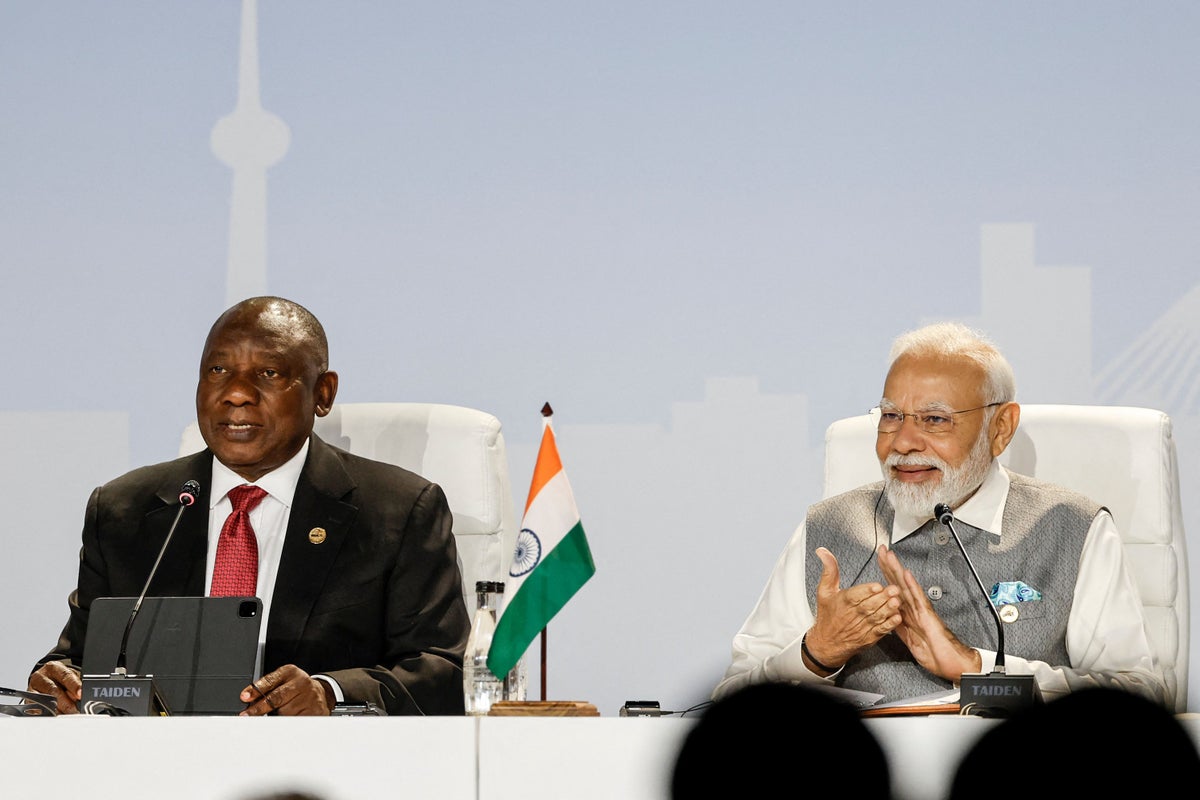
Six new countries including Saudi Arabia have been invited to join the Brics bloc of developing nations, South Africa has announced, after three days of closed-door discussions between members.
Argentina, Egypt, Ethiopia, Iran, Saudi Arabia and the United Arab Emirates have been invited to become full members of Brics, summit host Cyril Ramaphosa announced on Thursday.
The membership of the new members will come into effect from 1 January 2024, Mr Ramaphosa said.
The debate over expanding the bloc – which currently comprises Brazil, Russia, India, China and South Africa – was the key item on the agenda of the three-day summit in Johannesburg that culminated with the announcement.
The UAE’s president Mohamed bin Zayed welcomed the announcement, saying the country is looking forward to joining the bloc.
“We respect the vision of the BRICS leadership and appreciate the inclusion of the UAE as a member to this important group. We look forward to a continued commitment of cooperation for the prosperity, dignity and benefit of all nations and people around the world,” he said on X.
Chinese president Xi Jinping called it a “historic” moment that will write a new chapter for developing countries to work together in unity.
Mr Xi, Brazilian president Luiz Inácio Lula da Silva, Indian prime minister Narendra Modi and host country South Africa’s president Cyril Ramaphosa held meetings throughout the summit at the conference centre in Johannesburg’s Sandton financial district.
Chinese president Xi Jinping claps during the Brics summit at the Sandton Convention Centre— (AFP via Getty Images)
Russian president Vladimir Putin, who attended the forum on Tuesday via video link, did not attend the summit after an International Criminal Court warrant was issued for his arrest. Foreign minister Sergei Lavrov took part in discussions and meetings instead.
The Brics leaders welcomed the move and issued statements after Mr Ramaphosa’s announcement.
“Expansion and modernisation of Brics is an indication that institutions of the world must get accustomed to changing times,” Mr Modi said.
Mr Lula da Silva said: “We will remain open to new candidates”. He added that Brics “offers a source of creative solutions for the challenges that we face”.
Russian president Vladimir Putin speaks via video link during a press conference— (Reuters )
“This membership expansion is historic,” said Mr Xi, who skipped the opening speech of the summit, at a briefing with the other leaders. “It shows the determination of Brics countries for unity and cooperation for the broader developing world.”
In a video message, Mr Putin said: “The adoption of the guiding principles in the expansion of Brics will ensure that the role and importance of Brics in the world will continue to grow.”
China has called for the expansion of the bloc to counter Western multilateral forums at a time when geopolitical polarisation is gathering pace globally.
The move is being framed as a way to amplify the voice of developing nations, but some members have previously shown hesitation amid fears a shift in makeup could help Brics serve the geopolitical interests of Beijing and Moscow.
An Indian government source told The Independent that “significant development[s]” on the issue of expansion came during the first day of the summit on Tuesday, when the leaders present had a “retreat” which included dinner together.
“India took the lead in forging consensus on membership criteria and selection of new members,” the source said, adding that India’s objective in the talks was “to incorporate our strategic partners as new members”. Among the six countries invited, the UAE is one of India’s closest allies.
Despite India’s ongoing territorial dispute with China, Mr Xi and Mr Modi were pictured shaking hands and engaged in a brief interaction.
The other concrete policy that the bloc raised in South Africa is a broad plan to pivot from using the US dollar for trade between Brics nations and instead trade in local currencies.
South Africa said that more than 40 countries have expressed interest in joining Brics and 22 have formally requested to be admitted.
The expansion of Brics to include Saudi Arabia, which is the top oil exporter in the world and the bloc’s biggest trading partner in the Middle East, is expected to see the group of countries outstrip the gross domestic product of the G7.
However, the US leadership appeared to downplay the relevance of the multilateral business forum.
Jake Sullivan, the White House’s national security adviser, on Tuesday said that the Biden administration is “not looking at the Brics as evolving into some kind of geopolitical rival to the United States or anyone else’.
He said that the US has strong relations with several Brics members and “we will continue to manage our relationship with China, and we will continue to push back on Russia’s aggression”.







